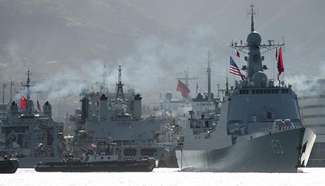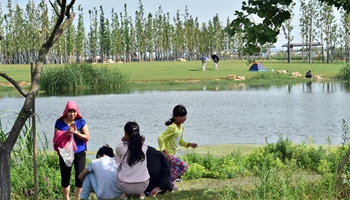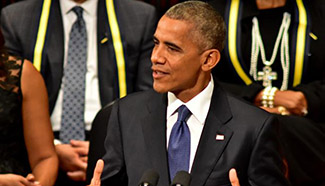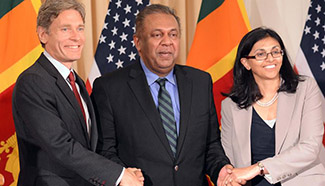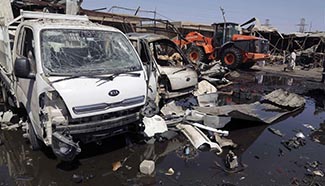SEOUL, July 13 (Xinhua) -- South Korea's defense ministry on Wednesday announced an agreement with the United States to deploy the U.S. missile defense system, called Terminal High Altitude Area Defense (THAAD), to its southeastern region despite continued opposition from neighboring countries.
One THAAD battery will be deployed to the Seongsan-ri region of the Seongju county in North Gyeongsang province, where South Korean Air Force's Hawk surface-to-air missile battery is located.
Yoo Jeh-seung, deputy defense minister for policy, said at a nationally televised briefing that the county was proposed as the best site to maximize military effectiveness and secure safety of residents in the region, which was approved by defense ministers of South Korea and the United States.
After Friday's decision between Seoul and Washington to deploy U.S. interceptors in the South Korean soil, the decision for the deployment site was announced earlier than expected amid mounting opposition and controversies at home and abroad.
On Friday, Seoul said the site would be announced within weeks, but nationwide protests against the THAAD deployment had spread especially in candidate sites, prompting the country to announce it just five days after the deployment decision. The two countries aim to deploy the U.S. missile defense system in the site by the end of next year.
China and Russia have expressed strong opposition to the THAAD deployment in the South Korean soil as its X-band radar can spot Chinese and Russian territories far beyond the Democratic People's Republic of Korea (DPRK).
The AN/TPY-2 radar can detect 600-800 km with a terminal mode, which South Korea plans to adopt, but it can be converted at any time, and takes less than a day to change, into a forward-based mode that ranges as far as 2,000 km because the two versions have the same hardware.
The THAAD battery will be operated by the U.S. Forces Korea (USFK) and the radar operation will not be made transparent.
"Even if (Seoul and Washington) try to politically promise (not to keep watch on Chinese and Russian territories), such pledge has no meaning in technical terms," said Cheong Wooksik, director of Peace Network, a local civic group.
"The terminal and forward-based modes just have difference in software. The conversion takes just several hours," Cheong said at a forum hosted by the People's Solidarity for Participatory Democracy (PSPD), a local civic group.
"What kind of radar mode Seoul will select does not matter. China's military expert cannot be dispatched to the THAAD battery to supervise its operation," said Kim Joon Hyung, professor of international studies at Handong Global University.
The professor said strong opposition from China and Russia came as the THAAD deployment means South Korea entering a part of the colossal U.S. missile defense network.
The deployment decision brought strong backlashes from the public, especially among people living in the site, on deep worries about a super-strong microwave emitted from the X-band radar.
About 5,000 residents in the Seongju county rallied earlier in the day near the site, with some writing in blood to protest against the deployment, according to local media reports. Some of the residents, including the county head, rode buses bound for the defense ministry's headquarters in Seoul to express opposition to the THAAD deployment.
Seoul selected the county as it is sparsely populated. About 45,000 people reside in Seongju, much lower than other candidate sites such as Chilgok in North Gyeongsang province with some 120,000 residents, Yangsan in South Gyeongsang province with 310,000 people and Pyeongtaek in Gyeonggi province where around 460,000 people live.
Near the county, the South Korean Air Force's surface-to-air missile battery is located at an elevation of about 400 meters in which the THAAD battery will be located. The Hawk missiles and some 170 soldiers allegedly would be moved nearby to protect the THAAD battery barracks.
The ministry explained that microwave from the THAAD radar will not affect regions 2.4 km away at an elevation of 210 meters and 5.5 km away at a 483-meter elevation. The county's residential area is located about 1.5 km away from the site and some 300 km southeast of the capital Seoul.
Related:
DPRK warns of "physical measures" against U.S. deployment of THAAD in S.Korea
PYONGYANG, July 11 (Xinhua) -- The army of the Democratic People's Republic of Korea issued a warning Monday that it will take "physical measures" against the deployment of the Terminal High Altitude Area Defense (THAAD) in South Korea by the United States.
Seoul and Washington announced Friday the deployment of the THAAD as part of the U.S. Forces Korea (USFK) stationed in South Korea to better tackle the so-called nuclear and missile threats from the DPRK. Full story
News Analysis: S.Korea seeks to defend THAAD deployment despite oppositions at home, abroad
By Yoo Seungki
SEOUL, July 11 (Xinhua) -- South Korean government officials on Monday sought to tout the need for deploying the U.S. missile defense system, called Terminal High Altitude Area Defense (THAAD), in its territory despite oppositions and controversies at home and abroad.
President Park Geun-hye told a meeting with her senior advisors that the THAAD deployment would be a defensive measure to protect her country from the Democratic People's Republic of Korea (DPRK)'s nuclear and missile threats. Park said the U.S. interceptors will neither target any third-party nations nor infringe on security interests of any other country. Full story




